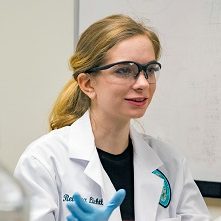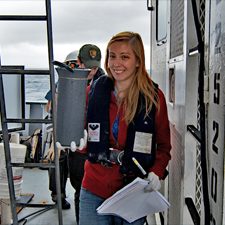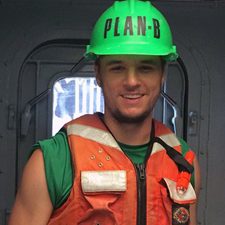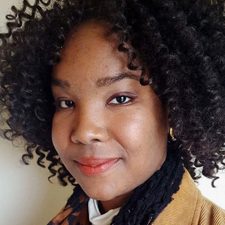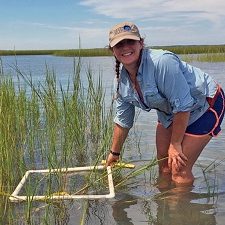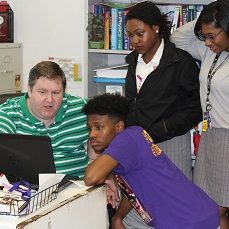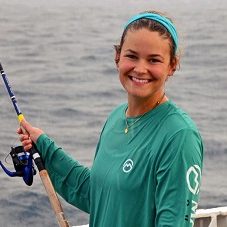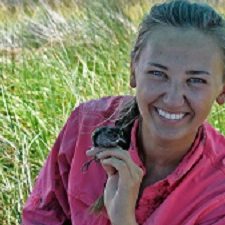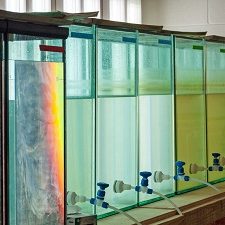The GoMRI Scholars Program recognizes outstanding graduate students and the vital research they contribute to improve understanding about the damage, response, and recovery following the Deepwater Horizon oil spill. The Scholars Program honors and builds community for these next generation of ocean science professionals.
These students serve as essential team members for much of the research underway and bring creativity, curiosity, and energy to the GoMRI scientific program. They represent the successful manifestation of the second GoMRI Legacy Goals, building scientific and intellectual capacity for response and mitigation strategies for future oil spill events.
Candidates for this program must be graduate students who have participated in a GoMRI-funded project for at least one year, whose work is primarily funded by GoMRI, and who are working on a dissertation or thesis based on GoMRI-funded science. On a semi-annual basis, the lead Principal Investigators of GoMRI-funded projects nominate students who meet these criteria.
Following confirmation, each scholar will receive a letter of congratulations declaring the title GoMRI Scholar along with a certificate from Dr. Rita Colwell, GoMRI Research Board Chair. GoMRI will collect information about these scholars and their careers and accomplishments for longitudinal studies and program impacts.
Below are GoMRI Scholars Highlight Stories that have been featured on the web site. For a complete list of scholars, click on the ‘People’ tab for any funded projects to view the list of GoMRI Scholars with affiliation for that project.
Laboratory studies at the University of Miami suggest that exposure to Deepwater Horizon oil may have negatively affected heart function in mahi-mahi, reducing their ability to swim efficiently. Lela Schlenker is expanding that research to investigate if and how oil exposure alters the way mahi-mahi migrate and respond to predators and prey in the wild.
Oil contains thousands of different compounds that each affect the environment and living organisms differently. While some compounds have been well-studied, there are exponentially more that have not.
Responders to the Deepwater Horizon incident applied unprecedented amounts of chemical dispersant on the surface oil slick and into the deep underwater plume forming from the riser pipe. Shortly thereafter, researchers observed that a brown flocculant material containing oil and dispersant components covered some deep-sea corals near the incident site.
Natural seeps are abundant in the Gulf of Mexico and help create a chemically unique habitat where microbial populations can flourish. Andy Montgomery is researching the relationship between marine microbes and ocean chemistry and how chemical shifts affect the role microorganisms play in biogeochemical cycling, a common pathway for chemicals and organic matter to move through the ocean.
Nikaela Flournoy’s scientific journey has always carried a societal tie, from her passion for research’s social relevance to her realizations about the relationship between society and STEM (science, technology, engineering, and math). Though she is excited to see a greater emphasis on STEM in primary and secondary education, she hopes to help expand STEM awareness and curriculum to students from diverse educational and social backgrounds.
Major disturbances such as oil spills can significantly affect populations of vulnerable saltmarsh species, which may result in greater impacts to the overall saltmarsh food web. Shelby Ziegler believes that a better understanding of what saltmarsh predator-prey interactions look like today can help identify changes in the food web following disturbances in the future.
Kendal Leftwich conducts acoustic research assessing how northern Gulf of Mexico dolphin populations changed and recovered over time to help researchers better understand the health of dolphin species living in affected areas.
Angie Hoover wants to know how large freshwater pulses and other environmental stressors affect the diet, growth, and condition of larval fishes. “The main motivation behind my work is to do something that betters the planet,” said Angie. “There is a lot of anthropogenic-sourced stress on the Earth, and I want to provide data and information that can help mitigate these issues.”
Seaside Sparrows live and forage in coastal Gulf of Mexico marshlands, some of which were oiled following the Deepwater Horizon incident. Sparrows in these oiled marshes likely ingested invertebrates that were also exposed to oil. Allison Snider uses DNA analyses to investigate potential long-term changes in the diets of Seaside Sparrows following Deepwater Horizon.
Crude oil contains tens of thousands of hydrocarbons, including polycyclic aromatic hydrocarbons (PAHs) that create unique chemical fingerprints for different types of oil. Dawei “David” Shi uses geochemical analysis techniques in mesocosm studies to track these fingerprints.


